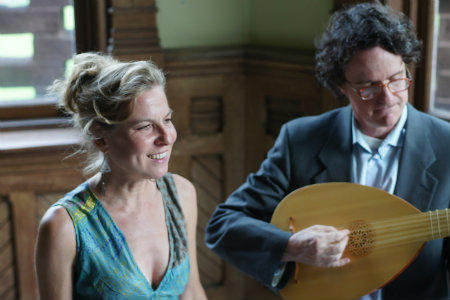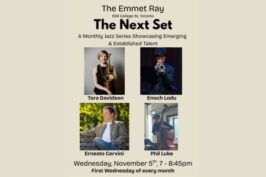Last month, Shakespeare’s saints and sinners took centre stage to the elegant music of the English Renaissance, as The Musicians In Ordinary (MIO) presented the second of three concerts honouring the man his contemporary, Ben Jonson, called “the Swan of Avon”, on the 400th anniversary of his death.
Along with MIO, David Klausner, professor emeritus of English and Medieval Studies, University of Toronto read excerpts from such plays as Macbeth, Hamlet and Romeo and Juliet in the original pronunciation.
The evening was a treat for the senses. Mixing music and words transported the audience to a different place and time. Excerpts included The Doctor from Macbeth [V:1], Lear from King Lear [II:2], The Queen from Hamlet [III:4], Pericles from Pericles [V:1], among others. Listening to Prof. Klausner read these in the historically-informed pronunciation of the English language, enhanced the accompanying music. In the programme for the evening, MIO soprano Hallie Fishel shares, “looking for rhyming schemes, how sentences scan, and the spelling of the words themselves, [one] can begin to gather some general ideas about how English in the period might well have sounded in the listener’s ear. For example… the words ‘beare’ and ‘eare’ really were pronounced with the same vowel sound.”

Photo by Alexandra Guerson
Complementing Shakespeare’s words, we heard airs or madrigals “apt for voices or viols” and consort music, along with lute solos from the Tudor and Stuart eras, composed by William Byrd, John Dowland and Thomas East. Fishel who sang al of the madrigals, also points out, that “variations in spelling, and… pronunciation, from song to song and from poet to poet, suggest that language was profoundly influenced by factors such as region and social status… perhaps because a character speaks in a lower class, or because a poet was trying to reflect a newer style of speaking, [MIO] take advice from the spellings preserved in each speech and song.”
The result was a harmonious blend of language, instruments, and voices. It was evident that all of us in the audience thoroughly enjoyed ourselves. The venue, Helliconian Hall, also made the evening more intimate and enjoyable. I was introduced to the work of MIO by a good friend years ago. Each time I attend one of their concerts, I leave feeling like I have learned something new about chamber music. If you have yet to be part of this experience, I cannot recommend it enough.
Sweet Swan of Avon concludes on the actual 400th anniversary of the Bard’s death, Saturday, April 23th, with Shakespeare’s Sorrows. Seth Lerer, English language and literature scholar and author, will return to Toronto to read excerpts from Pericles, Hamlet, Macbeth and other works. The Musicians In Ordinary’s strings will play the complete Lachrimae or Seven Tears by John Dowland, as well as airs by Dowland and his contemporaries. This evening is not to be missed.
Tickets are $30, $20 for students and seniors, available at the door. More information may be obtained from MIO’s website, or by calling 416-535-9956.






